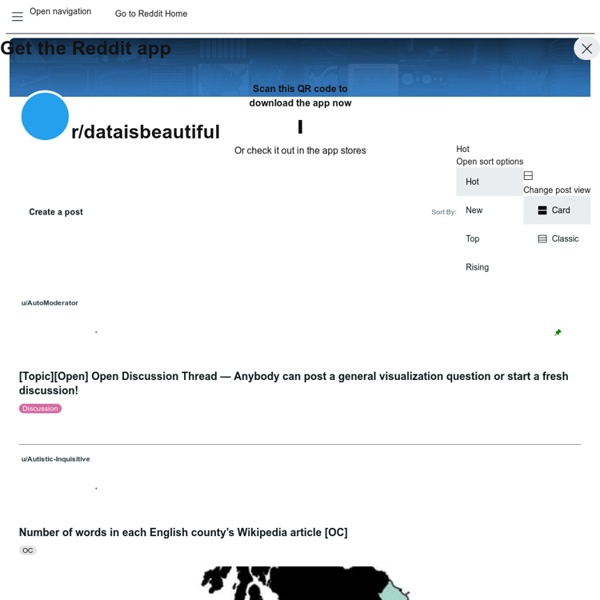



https://www.reddit.com/r/dataisbeautiful/
Related: Reference • Literacy Blogs /VlogsU.S: Geography, states, landmarks, maps, cities, population, laws, speeches U.S. States, Cities, History, Maps Year by Year: 1900–2015 Enter a year: Windows and Mirrors: Why We Need Diverse Books By Chad Everett, guest blogger I was an undergraduate student the first time it happened. One of my professors shared the following line from W.E.B. Dubois’ The Souls of Black Folk: “One ever feels his twoness, -- an American, a Negro; two souls, two thoughts, two unreconciled strivings; two warring ideals in one dark body, whose strength alone keeps it from being torn asunder.”
School Library Journal Four bold strategies to elevate your school library. Illustration by James Yang “A university is just a group of buildings gathered around a library,” wrote the historian and novelist Shelby Foote. Netflix Secret Codes Search One of the biggest Netflix complaints is that you spend more time browsing than you do watching. Netflix curates its homepage based on your preference but sometimes you just want to dive into a movie genre of your own accord. Below, we’ve got the Netflix ID Bible where we list all of the Netflix category codes or as they’re sometimes referred to, the Netflix secret codes!
Civic Online Reasoning We are in the midst of an information revolution in which we increasingly learn about the world from screens instead of print. If young people are not prepared to critically evaluate the information that bombards them online, they are apt to be duped by false claims and misleading arguments. To help teachers tackle teaching these critical skills, we’ve developed assessments of civic online reasoning—the ability to judge the credibility of the information that floods young people’s smartphones, tablets, and computer screens. Get Your Grok On A tool-strand post in an ongoing 2-strand series about Information Literacy How can we foster a “slow search” approach that maximizes what we don’t know through discovery? How can we take advantage of what we don’t know and use it more effectively in developing a search strategy?
Mind Over Media - New Resource for Teaching Propaganda and Media Literacy This is a guest post from writer and researcher Beth Holland (@brholland). I first met Professor Renee Hobbs from the Media Education Lab last spring at the SXSWedu conference. She led a fascinating discussion about how to foster media literacy and digital literacy in an age of machine learning and Artificial Intelligence. Towards the end of the session, she posed a question that has perplexed me for months: how do we help students develop critical literacies such that they comprehend what media might be telling them when they cannot readily view the biases behind the algorithms generating that information? In other words, when students are constantly surrounded by media and messages, how can they quickly, efficiently, and accurately identify propaganda or bias versus information?
Fun and Interesting Conversions Fun and Interesting Conversions <blockquote><p><span><b>You do not have JavaScript enabled.</b></span><br /><span>The conversions on this site require the use of JavaScript so please enable before continuing. For assistance in enabling JavaScript, please contact the webmaster.</span></p></blockquote> International Friends If you chat or post with friends from different countries, you might find this useful. Web Evaluation: Does This Website Smell Funny to You? One of my friends spent this past weekend working with her 2nd grade daughter on a research project. While her daughter flew through the arts and crafts portion and was able to handwrite the “sloppy copy” of her presentation, she struggled when it came to typing the final draft. She didn’t know where the period was.
100 Search Engines For Academic Research Back in 2010, we shared with you 100 awesome search engines and research resources in our post: 100 Time-Saving Search Engines for Serious Scholars. It’s been an incredible resource, but now, it’s time for an update. Some services have moved on, others have been created, and we’ve found some new discoveries, too. Many of our original 100 are still going strong, but we’ve updated where necessary and added some of our new favorites, too. Check out our new, up-to-date collection to discover the very best search engine for finding the academic results you’re looking for.